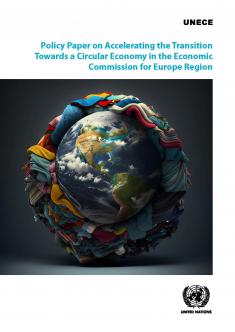
This policy paper reviews the state of play of traceability and transparency approaches in three economic sectors critical to the circular transition in the ECE region: the agrifood, garment and footwear, and minerals sectors. Moreover, it provides an overview of the challenges and opportunities for advancing the circular economy and highlights successful practices from the whole region. Lastly, it provides policy recommendations to leverage traceability and transparency for the circular economy.
The paper has been developed within the United Nations Development Account (UNDA) project “Accelerating the transition towards a circular economy and sustainable use of natural resources in the ECE region” (2021-2024), implemented by ECE in partnership with United Nations Environment Programme (UNEP). The project aims to accelerate the transition to a circular economy in the region, while supporting efforts to “build back better” after the COVID-19 pandemic. It supports the design and implementation of national policies, programmes and strategies on waste management, public procurement, innovation, trade and traceability of value chains, in line with member States recommendations emerging from the 69tha and 70th sessions of ECE.
The policy paper was prepared based on the findings of a large consultation process conducted by ECE and its consultancy team. It builds on the work of the UN/CEFACT Team of Specialists on ESG Traceability of Sustainable Value Chains in the Circular Economy, and its Sustainability Pledge initiative. It is the result of an in-depth analysis of existing policies, regulations and guidelines from governments and organizations worldwide, and international best practices on traceability and transparency in targeted sectors, as well as field research engaging national focal points from the ECE Circular STEP initiative.

